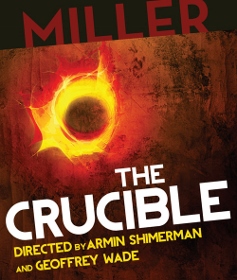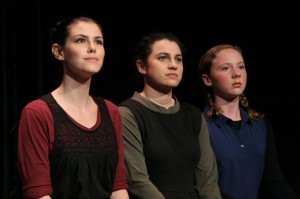BEDEVILED
An off-stage character is tortured by a Salem court in Arthur Miller’s The Crucible, a play which dramatizes the Salem witch trials of 1692. As heavy stones are placed upon his chest, the innocent man’s reported final words are “More weight.” This is exactly what Antaeus Company’s production needs in order to be more triumphant than it is. Unfortunately, the experimental concert-style staging – wherein actors deliver many 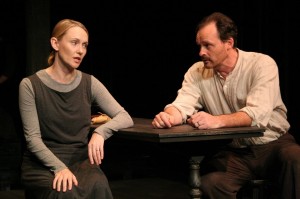 lines facing forward – ends up being more distracting than illuminating, and robs the production of the key emotional moments necessary for the play to pummel our senses. The playgoer is still promised some intense and palpable sensations as we witness a town go berserk from fear, but that is largely due to the script, one of the greatest works in American literature, and some rock solid performances. For those who have never witnessed this 1953 masterwork, written as an allegory of McCarthyism and blacklisting, the timeless and still-relevant themes of accusation-as-truth and religion-as-control will no doubt resonate, even with Antaeus’ gender-bending, colorblind casting. However, those who have seen this play before may find themselves longing for a more traditional approach.
lines facing forward – ends up being more distracting than illuminating, and robs the production of the key emotional moments necessary for the play to pummel our senses. The playgoer is still promised some intense and palpable sensations as we witness a town go berserk from fear, but that is largely due to the script, one of the greatest works in American literature, and some rock solid performances. For those who have never witnessed this 1953 masterwork, written as an allegory of McCarthyism and blacklisting, the timeless and still-relevant themes of accusation-as-truth and religion-as-control will no doubt resonate, even with Antaeus’ gender-bending, colorblind casting. However, those who have seen this play before may find themselves longing for a more traditional approach.
There is a magical suspension of disbelief that occurs when witnessing a play presented in radio format (L.A. Theatre Works, Lost Moon Radio, It’s a Wonderful Life: The Radio Play), as our mind fills in the gaps left by actors who read the script from music stands. But it’s jarring when co-directors Armin Shimerman and 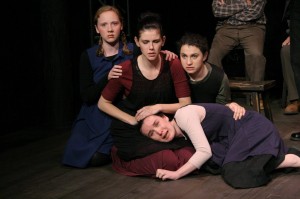 Geoffrey Wade’s staging begins with this face-forward format, and then suddenly switches to actors interacting with each other and then back again. I can see what the helmers were going for: some of the more villainous characters face out – as if these are the ones who can’t be trusted – and the more heroic characters look each other in the eye. But it’s both inconsistent and keeps actors from one of the most important ingredients in live thespian stagecraft: reacting. Plus, some actors sit at the rear of the stage and watch while others exit; there may have been a reason for each and every move on that stage, but eventually it comes down to the actors in the scene.
Geoffrey Wade’s staging begins with this face-forward format, and then suddenly switches to actors interacting with each other and then back again. I can see what the helmers were going for: some of the more villainous characters face out – as if these are the ones who can’t be trusted – and the more heroic characters look each other in the eye. But it’s both inconsistent and keeps actors from one of the most important ingredients in live thespian stagecraft: reacting. Plus, some actors sit at the rear of the stage and watch while others exit; there may have been a reason for each and every move on that stage, but eventually it comes down to the actors in the scene.
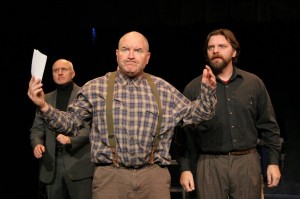 The story concerns a farmer, John Proctor, who had an affair with his 17-year-old maidservant, Abigail. As a result, John’s wife, Elizabeth, kicked Abigail off the farm, and the manipulative teenager tried to hex Elizabeth by performing a late-night pagan ritual with her girlfriends. When Abigail’s uncle, the domineering and greedy Reverend Parris, happens upon the rite, the girls’ fear leads them to name innocents as witches to alleviate any suspicions aroused by their activity. The accusations fan the flames of mistrust and the witch hunt begins.
The story concerns a farmer, John Proctor, who had an affair with his 17-year-old maidservant, Abigail. As a result, John’s wife, Elizabeth, kicked Abigail off the farm, and the manipulative teenager tried to hex Elizabeth by performing a late-night pagan ritual with her girlfriends. When Abigail’s uncle, the domineering and greedy Reverend Parris, happens upon the rite, the girls’ fear leads them to name innocents as witches to alleviate any suspicions aroused by their activity. The accusations fan the flames of mistrust and the witch hunt begins.
Many of Antaeus’ actors do a lot of film work, so their delivery into space can be quite effective. Still, I believe the staging device caused a discrepancy among actors (the show is double-cast; I saw “The Proctors”). As John, Christopher Guilmet never 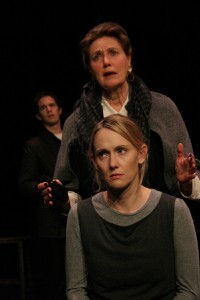 had a false note, playing the protagonist with equal parts courage, forthrightness, caution and shame. Devon Sorvari had some lovely and vulnerable moments as Elizabeth, but the coldness of the character came off as disconnected instead of taciturn (which I attribute to the staging). Marcia Batisse created a genuine, if somewhat overwrought, Tituba, Reverend Parris’s black slave from Barbados; later, however, an egregious error was made by having her play Hathorne, the presiding judge over the Salem Witch Trials, but not because of the gender switch: Hathorne should be unemotional, oblivious and hostile, yet Batisse went for some kind of professorial, attitude-drenched Jerry Springer-type guest with a broad British accent – it completely threw me out of the play. None of the other actors soared to devastating performances, but they did very good work. Only Joe Delafield as Reverend Parris floundered when it came to creating a fully-realized character; he had to resort to mannerisms to display emotion.
had a false note, playing the protagonist with equal parts courage, forthrightness, caution and shame. Devon Sorvari had some lovely and vulnerable moments as Elizabeth, but the coldness of the character came off as disconnected instead of taciturn (which I attribute to the staging). Marcia Batisse created a genuine, if somewhat overwrought, Tituba, Reverend Parris’s black slave from Barbados; later, however, an egregious error was made by having her play Hathorne, the presiding judge over the Salem Witch Trials, but not because of the gender switch: Hathorne should be unemotional, oblivious and hostile, yet Batisse went for some kind of professorial, attitude-drenched Jerry Springer-type guest with a broad British accent – it completely threw me out of the play. None of the other actors soared to devastating performances, but they did very good work. Only Joe Delafield as Reverend Parris floundered when it came to creating a fully-realized character; he had to resort to mannerisms to display emotion.
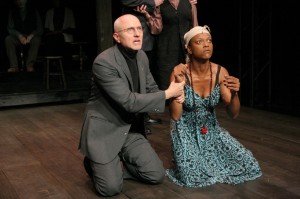 Wade’s notes indicate that “this production is set in a sort of ‘non-time,’” which is wholly appropriate given that the themes are so timeless. But the ‘non-time’ approach falters as a directorial vision when E.B Brooks’ costumes cleverly reside in a netherworld between country puritans and Old Navy, but then Stephen Gifford’s set consists of furniture right out of a 17th century Salem farmhouse. As for the differing styles of delivery, it’s a brave theatrical device, but it was used for one of the few plays I know that doesn’t need deconstructionist staging. It’s like chipping away at some of the marble on Michelangelo’s David to display it in a smaller museum. Yes, there were moments that I felt emotional pressure on my chest, but this Crucible should have crushed my heart. More weight, please.
Wade’s notes indicate that “this production is set in a sort of ‘non-time,’” which is wholly appropriate given that the themes are so timeless. But the ‘non-time’ approach falters as a directorial vision when E.B Brooks’ costumes cleverly reside in a netherworld between country puritans and Old Navy, but then Stephen Gifford’s set consists of furniture right out of a 17th century Salem farmhouse. As for the differing styles of delivery, it’s a brave theatrical device, but it was used for one of the few plays I know that doesn’t need deconstructionist staging. It’s like chipping away at some of the marble on Michelangelo’s David to display it in a smaller museum. Yes, there were moments that I felt emotional pressure on my chest, but this Crucible should have crushed my heart. More weight, please.
photos by Karianne Flaathen
The Crucible
Antaeus Company
scheduled to end on July 7, 2013
for tickets, call 818-506-1983 or go to http://www.antaeus.org
